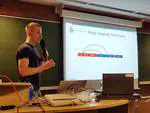Biography
Luca Wilke is a researcher in Microsoft’s Azure Research group in Cambridge (UK). His research interests include Trusted Execution Environments and Systems Security.
Interests
- Trusted Execution Environments
- Systems Security
- Side-Channels
Education
-
PhD in Computer Science, 2020 - 2025
University of Lübeck
-
MSc in Computer Science, 2017 - 2020
University of Lübeck
-
BSc in Computer Science, 2014 - 2017
University of Lübeck
Recent Publications
Quickly discover relevant content by filtering publications.
(2025).
TDXploit: Novel Techniques for Single-Stepping and Cache Attacks on Intel TDX.
34th USENIX Security Symposium, 2025.
(2025).
BadRAM: Practical Memory Aliasing Attacks on Trusted Execution Environments.
IEEE S&P 2025.
(2024).
TDXdown: Single-Stepping and Instruction Counting Attacks against Intel TDX.
ACM CCS 2024.
(2024).
SNPGuard: Remote Attestation of SEV-SNP VMs Using Open Source Tools.
2024 IEEE European Symposium on Security and Privacy Workshops (Euro S&P).
Recent & Upcoming Talks
In this talk, we present the findings of our TDXdown paper and outline ideas for more in-depth defences.

